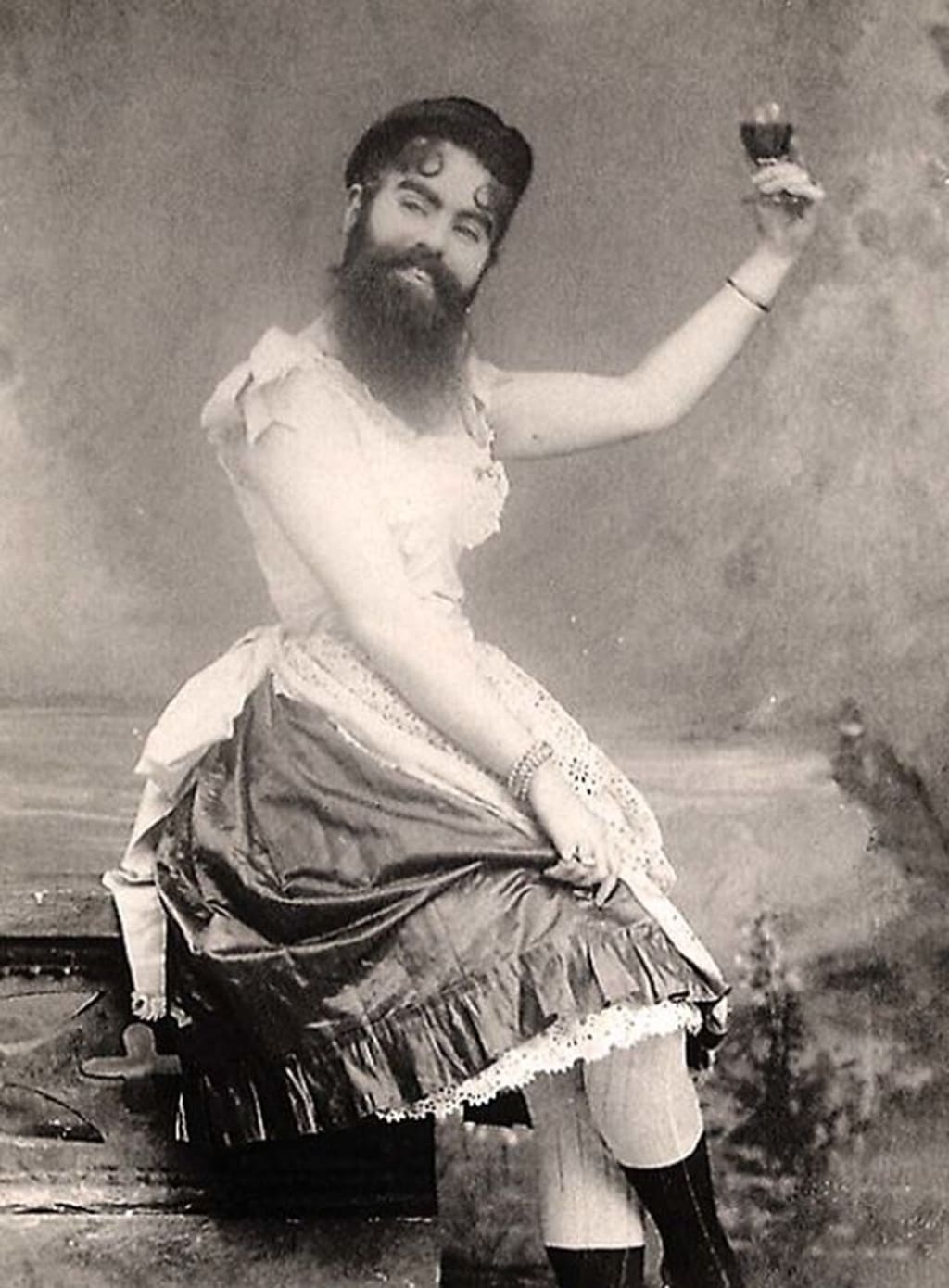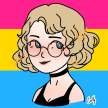Bearded (Demi) Lady
Exploring femininity as a demi-girl with PCOS

If you try to picture someone who has a beard, would you automatically imagine a man? It wouldn’t be surprising or even wrong if you did. Facial hair, however, is just one of the numerous things that are unnecessarily gendered and labeled as something that is masculine and can only be masculine. By society’s standards, a beard is something that is exclusively for men while biological women do not have hair on their face or chest.
And yet we hear of “freak shows,” of the Bearded Lady. We hear of peach fuzz burned off with a laser, of razors and wax and bleaching. If the assertion that women do not have facial hair were true, why would these things exist? Clearly, it is possible for a female to grow hair on her face. The actual rule that we put in place hundreds of years ago concerning this matter is not that women do not or cannot have facial hair, but rather that women should not have facial hair because it isn’t feminine as women should be.
I, however, like many others, do not fit into this role. I have lived much of my life as a woman and my body naturally grows hair on my face and chest. I have Polycystic Ovary Syndrome, or PCOS, which can often cause a symptom known as hirsutism—an excess in facial and/or body hair in people assigned female at birth. And although hirsutism can be minor, I am in the minority of people whose hair growth is much more substantial. If left to grow naturally I will eventually have a thick, curly, ginger beard along with more sparse hair on my chest and stomach.
This is not the result of me being genderqueer or wanting to be gender-nonconforming. This is simply something my body does naturally. My ovaries don’t know how I identify, what my pronouns are, or how I wish to present myself. All they know is how to do their job, albeit in a very dysfunctional way. So the hair grows, and while I no longer identify as a woman, this is still a part of me that I struggle to accept.
Ever since I had the attention span to watch a TV screen I’ve seen advertisements for women’s razors and shaving gel played amidst sitcoms and movies. I heard girls at school discuss shaving their legs for the first time and read “coming of age” books discussing body hair and its removal. The constant reminders of what femininity was supposed to be just made me feel awful. Girls were expected to shave their legs, a part of the body where most people naturally grew hair, and I had it on my face and chest too? I felt like there was something wrong with me, and while yes, my hirsutism is a result of a hormonal disorder, the fact that there is hair on my face should never have been a source of shame or embarrassment.
It didn’t help that I was also very paranoid and scared of shaving. I wouldn’t even shave my legs for fear of hurting myself. I tried other methods to rid myself of my unwanted hair, though. I tried electronic razors, which only cut the hair down to itchy stubble. I tried wax, which was so painful it took me forever to remove just the small patch I applied as a test. And I tried Nair, a hair removal cream that burned my skin so badly I couldn’t leave it on long enough to actually work. So for the most part I simply trimmed the beard on my face the best I could and hoped that it wasn’t too noticeable.
Throughout my adolescence and much of my young adulthood, I was embarrassed and paranoid about how people were viewing my appearance. I hated the fact that no matter how I acted, what I did, or how I dressed, I couldn’t be completely “feminine” because my body simply didn’t fit that mold. It’s a bit ironic looking back, that I was trying so desperately to hide something so I could be categorized as something I never even was to begin with. But then again, my facial and body hair was something I struggled with even after coming to terms with my gender identity. It’s still something I don’t like, something I feel judged and sometimes excluded because of.
For the most part, people don’t bring up my appearance and simply ignore the facial hair, and those who do mention it (mostly online) have only negative things to say. There was one instance, however, where someone was not only kind about this condition I have, but actually praised it. He was an older man—a Hospice Chaplain who was visiting my late grandmother. He brought up the topic very gently with a bright smile, mentioning that a friend of his was a woman who worked in sideshows years ago as a “bearded lady.” And for the first time in my life, I heard what I’d always thought of as a horrendous flaw be talked about positively.
“I think it just looks fabulous on you,” he’d said. “You have the perfect face for it, you really look beautiful. I hope you never shave it off, it really is so unique and lovely.”
It’s an odd feeling to be confronted with someone who actually admires the thing you’ve become so used to hating about yourself. It was jarring to hear such praise from someone I’d never met before and it made me start to reevaluate my entire perception of my own body and appearance. Perhaps I should embrace the hair my body naturally grows—be glad that I as a nonbinary person was born with a naturally androgynous body. In fact, my body, much like my gender, is almost entirely traditionally “female” save for this one thing that puts me just outside of that label. I should view that as a positive thing, but unfortunately, I haven’t gotten to that point, yet. I want to love my body and not be ashamed of any part of it, but I’ve been so conditioned to hate this entirely natural thing that I feel guilt for not aligning with gender roles I don’t even want to adhere to.
Hair has no gender, and no one should feel obligated to put blades, hot wax, or chemicals on their face just because their body does not behave the way people think it should. I have seen numerous women online with hirsutism who are so beautiful and embrace this condition with grace and confidence. Harnaam Kaur, for example, is a British model, activist, and social media personality who like me has a beard due to PCOS. She’s embraced her body and her condition and she is absolutely gorgeous. I can only hope to one day be as confident and comfortable with myself as she is.
For now, I’m working toward acceptance. I can’t change what my body naturally does. Even though my other PCOS symptoms are mostly corrected thanks to birth control, the hair will never fully go away. It’s just a part of me like everything else and it doesn’t define who I am or how I identify. Maybe one day I’ll embrace this part of me that makes me unique. Maybe I’ll stop worrying about the label others may put on me and be happy simply existing. Hair is just hair, no matter where it is on one’s body. Femininity is not defined by a smooth face just because many women don’t have hirsutism.
Gender norms only exist because we invented them and they will only go away if we continue to confidently break them. My existence breaks those gender norms and while I still struggle to accept that, I refuse to apologize or make myself uncomfortable for the sake of such outdated standards.
About the Creator
Sarah Rhoden
Writing about anything and everything (from the perspective of a mentally ill, probably autistic, nonbinary, pansexual nerd)
25 she/they






Comments
There are no comments for this story
Be the first to respond and start the conversation.